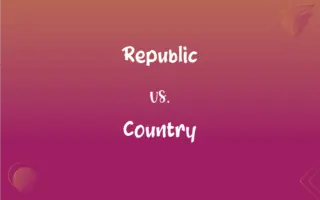Money vs. Currency: What's the Difference?
Edited by Janet White || By Harlon Moss || Published on December 15, 2023
Money is a medium of exchange for goods and services. Currency is a specific form of money issued and regulated by a government.

Key Differences
Money is a broad term that encompasses any medium accepted in exchange for goods and services, whereas currency specifically refers to physical tokens, such as coins and banknotes, issued by a government as legal tender.
Currency forms a subset of money, representing money in its physical form. In contrast, money can include non-physical forms, like electronic funds, which are not considered currency.
Money serves as a unit of account and a store of value, while currency, being a physical representation of money, primarily facilitates the physical exchange of goods and services.
Currency is the tangible manifestation of money within a particular country or economic zone, embodying the concept of money in a physical, exchangeable format.
The value of currency is often linked to the stability and economy of the issuing government, whereas the concept of money encompasses broader economic contexts, including non-governmental forms like cryptocurrency.
ADVERTISEMENT
Comparison Chart
Definition
Medium of exchange, including physical and digital forms.
Physical form of money, like coins and notes.
Form
Can be physical or electronic.
Always physical.
Issuance
Not always issued by a government.
Issued by a government.
Scope
Broader concept, includes currency.
A specific type of money.
Examples
Bank deposits, electronic funds, cryptocurrencies.
Dollar bills, coins, euro notes.
ADVERTISEMENT
Money and Currency Definitions
Money
Assets, property, or resources owned by someone or something.
His money was invested in the stock market.
Currency
A system of money used in a particular country.
The currency in France is the Euro.
Money
A means for people to trade goods and services indirectly.
She used her money to buy a new car.
Currency
Paper bills and coins in circulation.
He exchanged his currency for dollars before the trip.
Money
An official medium of exchange and measure of value.
The store accepts both cash and digital money.
Currency
The physical representation of money.
The new currency design includes advanced security features.
Money
The wealth or income of a person, organization, or country.
They donated a significant amount of money to charity.
Currency
Government-issued money that is not backed by a physical commodity.
The country introduced a new digital currency.
Money
Any item or verifiable record accepted as payment.
She prefers to use cash as her primary form of money.
Currency
The legal tender of a sovereign state.
The currency was devalued due to economic instability.
Money
A medium that can be exchanged for goods and services and is used as a measure of their values on the market, including among its forms a commodity such as gold, an officially issued coin or note, or a deposit in a checking account or other readily liquefiable account.
Currency
Money in any form when in actual use as a medium of exchange, especially circulating paper money.
Money
The official currency, coins, and negotiable paper notes issued by a government.
Currency
Transmission from person to person as a medium of exchange; circulation
Coins now in currency.
FAQs
What is currency?
Currency is the physical form of money, such as coins and banknotes, used within an economy.
What is money?
Money is a medium of exchange that can be used to facilitate the buying and selling of goods and services.
Is cryptocurrency considered money or currency?
Cryptocurrency is considered a form of money, specifically digital money, but not a traditional currency.
What makes money valuable?
Money's value comes from a common agreement to use it as a medium of exchange and a store of value.
Are checks considered currency?
No, checks are not currency; they are a means of transferring money from one account to another.
How do exchange rates affect currency?
Exchange rates determine how much one currency is worth in terms of another, affecting international trade and economics.
Can currency exist in digital form?
Generally, currency refers to physical forms, but some digital forms like digital currencies are emerging.
How is money different from currency?
Money includes both physical (currency) and non-physical forms like electronic funds, whereas currency is strictly the physical representation.
What is fiat money?
Fiat money is currency that a government has declared to be legal tender, but it is not backed by a physical commodity.
Can money lose its value?
Yes, money can lose value due to factors like inflation or economic crisis.
How has digital technology impacted money?
Digital technology has introduced new forms of money like electronic funds transfers and digital currencies.
Is it possible for a currency to become obsolete?
Yes, currencies can become obsolete due to factors like political changes, hyperinflation, or the introduction of a new currency.
Who issues currency?
Currency is typically issued by a country's government or central bank.
Why do countries have different currencies?
Different currencies are used to support the economic policies and needs of individual countries.
Is bartering considered using money?
No, bartering is a direct exchange of goods and services without using money.
Can money be intangible?
Yes, electronic funds and digital currencies are intangible forms of money.
How does inflation affect money?
Inflation decreases the purchasing power of money, meaning more money is needed to buy the same amount of goods and services.
What is the role of central banks in managing currency?
Central banks manage currency supply, set interest rates, and maintain financial stability.
Is gold a form of currency?
Gold is not a currency, but it can be used as money, particularly as a store of value.
What determines the value of a currency?
The value of a currency is often determined by supply and demand, economic stability, and government policies.
About Author
Written by
Harlon MossHarlon is a seasoned quality moderator and accomplished content writer for Difference Wiki. An alumnus of the prestigious University of California, he earned his degree in Computer Science. Leveraging his academic background, Harlon brings a meticulous and informed perspective to his work, ensuring content accuracy and excellence.
Edited by
Janet WhiteJanet White has been an esteemed writer and blogger for Difference Wiki. Holding a Master's degree in Science and Medical Journalism from the prestigious Boston University, she has consistently demonstrated her expertise and passion for her field. When she's not immersed in her work, Janet relishes her time exercising, delving into a good book, and cherishing moments with friends and family.






































































